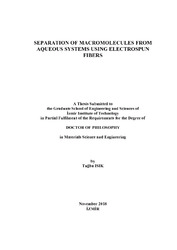Please use this identifier to cite or link to this item:
https://hdl.handle.net/11147/7165| Title: | Separation of Macromolecules From Aqueous Systems Using Electrospun Fibers | Other Titles: | Elektroeğirme Lifleri Kullanarak Makromoleküllerin Sulu Sistemlerden Ayrılması | Authors: | Işık, Tuğba | Advisors: | Demir, Mustafa Muammer | Keywords: | Water filters Oil filters Biologic filters Polymeric fibers Electrospinning |
Publisher: | Izmir Institute of Technology | Source: | Isık, T. (2018). Separation of macromolecules from aqueous systems using electrospun fibers. Unpublished doctoral dissertation, Izmir Institute of Technology, Izmir, Turkey | Abstract: | Electrospinning has been recognised as a versatile method for the fabrication of continuous polymeric fibers with various type of morphology. Since it allows changing the fiber diameter, surface morphology and porosity by adjusting the solution and instrumental parameters, electrospun fibers present a wide range of properties that cannot be found in bulk materials. Through this thesis, removal of several types of pollutants from the aqueous systems was studied by using the electrospun fibers fabricated from both virgin and waste polymers. The first part of the dissertation deals with the removal of macromolecular pollutants from aqueous systems by using waste-based electrospun fibers. Electrospun fibers fabricated from CD cover and expanded polystyrene wastes were utilized for the protein-rich medical waste treatment by using Bovine Serum Albumin, Myoglobin and Trypsin as protein models. Electrospun fibers from expanded polystyrene wastes were utilized for the remediation of oily wastewaters. The second part of the dissertation deals with the polyatomic nuclear waste removal using uranyl ions as analyte and amidoxime functionalized PIM-1 electrospun fibers. The last part of this dissertation describes an approach for the fabrication of fluorine-free hydrophobic surfaces by electrospraying of methacrylate based linear and hyperbranched copolymers. Elektrodokuma, çeşitli morfolojiye sahip polimerik liflerin üretilmesi için çok yönlü bir yöntemdir. Çözelti ve enstrümantal parametrelerin değiştirilmesiyle lif çapı, yüzey morfolojisi ve gözeneklilik gibi çeşitlendirilmesine izin verdiğinden, elektrodokuma lifler yığın malzemelerde bulunamayan çok çeşitli özellikler sunarlar. Bu tezde, hem ticari hem de atık polimerler kullanılarak üretilen elektrodokuma lifler kullanılarak sulu sistemlerden çeşitli kirletici türlerinin uzaklaştırılması incelenmiştir. Tezin ilk kısmı, atık bazlı elektrodokuma lifler ile makromolekül yapıdaki kirletici maddelerin sulu sistemlerden uzaklaştırılması ile ilgilidir. CD kapağı ve strafor atıklarından üretilen elektrodokuma lifler ile Bovin Serum Albümin, Miyoglobin ve Tripsin model proteinleri kullanılarak hazırlanan protein zengini tıbbi atıklar temizlendi. Strafor atıklardan üretilen elektrodokuma lifler ile yağlı atık sular iyileştirildi. Tezin ikinci kısmı, amidoksim grubu kullanılarak fonksiyonel hale getirilmiş PIM-1 lifleriyle radyoaktif uranyum iyonlarının sulu sistemlerden giderilmesiyle ilgilidir. Bu tezin son kısmı, metakrilat bazlı lineer ve dallanmış kopolimerlerden elektrodokuma ile hidrofobik yüzeylerin üretilmesine yönelik bir yaklaşımı anlatmaktadır. |
Description: | Thesis (Doctoral)--Izmir Institute of Technology, Materials Science and Engineering, Izmir, 2018 Includes bibliographical references (leaves: 102-125) Text in English; Abstract: Turkish and English |
URI: | https://hdl.handle.net/11147/7165 |
| Appears in Collections: | Phd Degree / Doktora |
Files in This Item:
| File | Description | Size | Format | |
|---|---|---|---|---|
| T001889.pdf | doctoralThesis | 13.52 MB | Adobe PDF |  View/Open |
CORE Recommender
Page view(s)
294
checked on Mar 31, 2025
Download(s)
128
checked on Mar 31, 2025
Google ScholarTM
Check
Items in GCRIS Repository are protected by copyright, with all rights reserved, unless otherwise indicated.